The data of money
Topics
Regions
The international bank transfer system, SWIFT, is a form of contemporary digital colonialism and surveillance capitalism as it is run by US firms and provides data to US government agencies. Drives by governments and philanthropists to increase use of digital money will only strengthen it further.
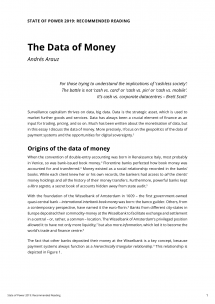
Downloads
Authors
For those trying to understand the implications of ‘cashless society’: The battle is not ‘cash vs. card’ or ‘cash vs. pin’ or ‘cash vs. mobile’. It's cash vs. corporate datacentres – Brett Scott
Surveillance capitalism thrives on data, big data. Data is the strategic asset, which is used to market further goods and services. Data has always been a crucial element of finance as an input for trading, pricing, and so on. Much has been written about the monetisation of data, but in this essay I discuss the data of money. More precisely, I focus on the geopolitics of the data of payment systems and the opportunities for digital sovereignty.
Origins of the data of money
When the convention of double-entry accounting was born in Renaissance Italy, most probably in Venice, so was bank-issued book money. Florentine banks perfected how book money was accounted for and transferred. Money existed as a social relationship recorded in the banks’ books. While each client knew her or his own records, the bankers had access to all the clients’ money holdings and all the history of their money transfers. Furthermore, powerful banks kept a libro segreto, a secret book of accounts hidden away from state audit.
With the foundation of the Wisselbank of Amsterdam in 1609 – the first government-owned quasi-central bank – international interbank book money was born: the banco guilder. Others, from a contemporary perspective, have named it the euro-florin. Banks from different city-states in Europe deposited their commodity-money at the Wisselbank to facilitate exchange and settlement in a central – or, rather, a common – location. The Wisselbank of Amsterdam’s privileged position allowed it to have not only more liquidity, but also more information, which led it to become the world’s trade and finance centre.
The fact that other banks deposited their money at the Wisselbank is a key concept, because payment systems always function as a hierarchically triangular relationship. This relationship is depicted in Figure 1.
Figure 1: Interbank payment triangular relationship
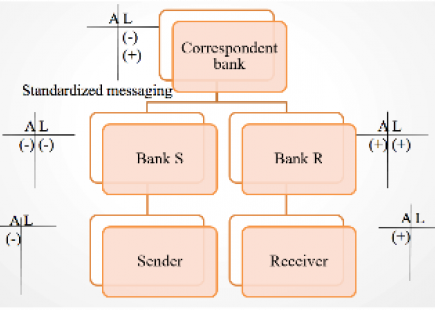
A represents Assets and L liabilities. Whichever is the bank at the apex of the pyramid has the most liquidity, but also the most information. It witnesses the transactions that occur below it. The bank at the top of the pyramid worries the least about bank runs, because financial transactions are only records on its books (liabilities). This is what former French Finance Minister – and subsequent President – Valéry Giscard d’Estaing referred to as ‘the exorbitant privilege’.
Digital sovereignty of payment systems
The apex of the pyramid in today’s world is the US Federal Reserve, the issuer of dollars. In other words, banks from around the world have accounts at banks that have accounts at the New York Fed. Even the world’s largest central banks resort to the New York Fed when in need of liquidity. This is why the US can exert its unipolar and hegemonic status with financial sanctions by the Office of Foreign Assets Control or by New York courts.
In today’s world, the messages that flow from the base of the pyramid to the top and back down again use three types of software. For an intrabank transaction – meaning that the transfer occurs within the bank – it uses the bank’s proprietary messaging software: a set of straightforward accounting instructions that alter that one bank’s books. Those systems are usually digitally sovereign because they are suited to domestic regulatory requirements with constant adaptations with in-house or close providers. When it is an inter-bank transaction, the banks predominantly use the central bank’s state-owned and digitally sovereign regulated messaging service software: in the US it would be the FedWire, in the eurozone if would be Target2, in Ecuador it is called SNP. Increasingly, more payments (such as credit and debit cards) are channelled via Automatic Clearing Houses (ACH), which are usually consortium-based private entities with their own technology, but with relatively rigorous oversight by central banks.
For international transactions between any two banks in the world, the software used is SWIFT. However, SWIFT is owned by private firms and although it is based in Belgium, its majority stake is controlled by US banks. Its message protocols are open and available as ISO 20022 standards. It is analogous to saying that e-mail protocols are open but the software to use them is privatised by a global monopoly that charges a fee for every e-mail sent. SWIFT is obviously not digitally sovereign, but could be seen as a pillar of contemporary digital colonialism. There are retail cross-border payments known as remittances that usually bypass the banking system. International remittance businesses are private, use proprietary technology for the retail operations as an international ACH would do, and usually settle their affiliates’ net accounts with wholesale SWIFT transactions.
Geopolitics of the data of payment systems
For all practical purposes, the US government has broad and unrestricted access to almost all international cross-border transactions by accessing SWIFT data. In 2009, the US exerted its geopolitical influence directly when the EU was forced to issue a directive specifically to share SWIFT data with the US government. In fact, during the Obama Administration, the US government established extraterritorial file transfer protocols (FTPs) with basically all the banks in the world. For now, this ‘International Data Exchange Service’ is used in order to receive data on US persons’ finances. In a global economic system based on money, this kind of global surveillance by only one government is a major issue. SWIFT itself has recently decided to embark on surveillance capitalism. In September 2018, SWIFT created a new institutional Head of Data Analytics. The person appointed to lead this division is a former Google global security and compliance strategist and an advisory member to the European Agency for Network and Information Security.
The international remittance market is populated by many small firms and a few dominant US firms: Western Union, Moneygram and Euronet (Ria). The data for hundreds of millions of international transactions per year is stored by these companies. Due to the USA PATRIOT Act, they must be made available to the US government agencies. In 2015, PayPal acquired a growing provider, Xoom, to ‘strengthen its international business’. In 2018, the US Committee of Foreign Investment rejected the intended purchase of MoneyGram by Jack Ma’s Chinese firm Ant Financial (provider of Alipay). Reuters cites concerns over safety of data and lobbying by Euronet.
However, despite their crucial importance, the volume of cross-border transactions is dwarfed by the number of domestic interbank payments, by digital and cash payments. The scale of selected countries’ payments is shown in Table 1.
Table 1: Payments by type, selected countries (in number of transactions)
|
Country |
SWIFT: Cross-border |
Domestic non-cash |
|
Brazil |
24 million |
31 billion |
|
China |
53 million |
134 billion |
|
Germany |
440 million |
21 billion |
Source: BIS, 2018
In terms of the domestic interbank payment systems, national central banks consider these a key asset and raison d’être, making it unlikely that they would be privatised or outsourced abroad. They manage billions of transactions a year. However, to my knowledge, most central banks do not use these data in any meaningful way except for simple arithmetic to determine net positions for clearing and settlement. The abundant data is grossly underused.
Figure 2: The value of payments dwarfs GDP1
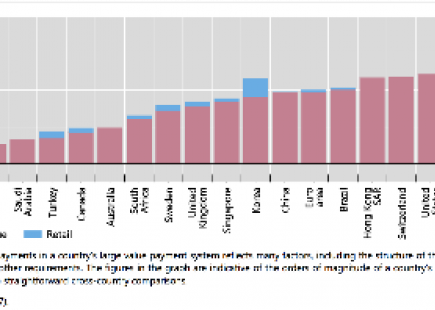
Source: Borio, 2018.
The US government also has access to most of the world’s plastic (credit and debit card) money data. Because Visa and Mastercard, the dominant US companies with a combined 81 per cent of global market share, store a copy of the financial information in their US corporate datacentres, the US government can lawfully access this information. A Canadian government agency confirmed that a Canadian bank’s Visa operations are stored in US servers. ‘As recently as a couple of years ago, Visa’s stated policy was to keep all data-processing facilities within US borders, a policy that was evidently made obsolete when the company began its acquisition of Visa Europe in 2015’ and its new datacentre in Singapore. Visa informed the UK parliament that they ‘operate two redundant data centres in the UK, meaning that either one can independently handle 100 percent of the transactions for Visa in Europe’. MasterCard’s global transactions are stored and run in its US datacentres. This is so even if a foreign bank issues the card and the money is spent in other countries. The US government is keen on opposing data localisation for plastic money. In fact, US senators urged the Indian central bank to undo its very recent plastic money data localisation rule.
In addition, cross-border spending of the plastic money – at least in the case of payments to and from Ecuador – is settled in US and UK banks. With settlement comes data for each of those transactions.
Most transactions, however – at least outside rich countries – are settled in cash. With cash, there is no such triangular relationship. Data for person-to-person (P2P), person-to-business (P2B and B2P) and business-to-business (B2B) cash payments simply do not, and cannot, exist in centralised datacentres. The largest potential for data of money comes from substituting cash payments with triangular electronic payments. A MasterCard executive confirms this: ‘When you look at payments overall, the biggest opportunity we have is not against another payment process. It’s with cash and check, because the majority of all payment transactions are still done via cash and check. You see it declining at a very fast rate every year. But today over half of the transactions are cash and check’. In fact, MasterCard has formed ‘an independent subsidiary… [that] combines expertise, data, technology, and philanthropic investments’ to make use of this harvested data for philanthropic purposes.
Figure 3: Payment instrument mix for countries in 2015
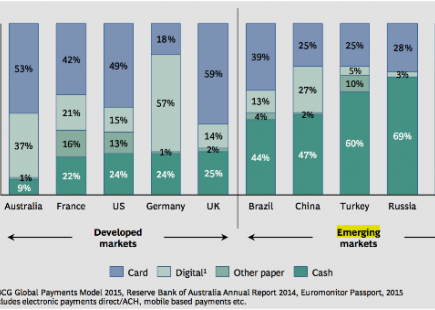
Source: BCG and Google, 2016
USAID, the US bilateral aid agency, along with US philanthro-capitalists led by the Bill & Melinda Gates Foundation, have embarked on a mission to harvest and access billions of untapped transaction data for ‘digital profiling’, i.e. surveillance capitalism purposes. They created an organisation called ‘Better Than Cash Alliance’, now led by Visa and MasterCard, to ‘dwindle the usage of cash’. Recent events in India serve as a good example of this agenda.
Demonetisation was anticipated as part of the Digital India vision in mid-2014: ‘All financial transactions above a threshold shall be made electronic & cashless’. Given its size and considering the lack of access of US firms to the Chinese payments’ market, the US government and the Gates Foundation were very active in promoting demonetisation in India even as early as 2013. Boston Consulting Group and Google issued a report that called the Indian payments’ market a ‘$500 Billion Pot of Gold’ shortly before the government’s announcement. While for average Indians demonetisation was regarded as a catastrophic failure, for the members of the Better Than Cash Alliance it was a success. The globally dominant issuers of plastic money, the US firms Visa and MasterCard, greatly benefited from the demonetisation experiment in India.
The only significant country that has been successful and strategic in exercising sovereign protectionism of their payment systems – and its data – is China. The People’s Bank of China (PBOC) has expressly protected its market for payments services. First, it granted monopoly rights to UnionPay, the national state-owned plastic money champion. Then, after losing a World Trade Organization (WTO) dispute, by not complying with it. After several years, it agreed bilaterally with the US to extend compliance with the WTO ruling. Finally, when MasterCard and Visa were ready to enter the Chinese market, the PBOC changed its regulatory technical standard for payment processing. In November 2018, the PBOC approved the entry of American Express, another US firm, but as a 50:50 joint venture with a Chinese fintech firm.
Given the path of internet-based and mobile technologies, plastic money is projected to become less relevant than electronic payments. Therefore, USAID, Citibank and Omidyar are pushing for commercial bank-led mobile and online electronic payments as another alternative to cash, under the umbrella of financial inclusion. Omidyar is the philanthropic wing of PayPal, the largest US e-payment firm. Citibank pushed aggressively to promote non-bank branches, but they were quickly overtaken by mobile technology. Besides PayPal, and after several failures, there are no clear US leaders in the global mobile and e-payment international markets.
Chinese private firms WeChat (Tenpay) and Alipay are the large players (40 per cent and 54 per cent of the Chinese market, respectively) that are ready for global expansion in the mobile and electronic payment markets. Each of these companies was the apex for each of their pyramid networks and harvested the payments data successfully into insurance, credit-scoring and even loans. The PBOC recently created a multi-stakeholder clearing service for mobile and online payments called Nets Union; it is now the Chinese government that hovers at the top of the pyramid. According to Forbes: ‘Until recently, information about capital flow was tightly guarded by third-party payment companies and was only used for targeted marketing and credit scoring, which bypassed the regulator… it would require Tenpay and Alipay to disclose valuable data to the government and competitors, both benefiting smaller payment providers’.
Digital cash as digital sovereignty
As shown, international cross-border payments are currently US-centric. An open-source alternative to SWIFT and, possibly, certain distributed ledger technologies could advance an international payment system of the global digital commons. However, in the short term, digital sovereignty in cross-border payments seems distant, unless sanctions on Iran cause BRICS and the EU to unite in establishing alternative systems. In terms of plastic money, because of the US incumbents and their private global standards, apart from data localisation, there is very little space for digital sovereignty.
However, in terms of interbank payments and electronic and mobile payments, there are untapped opportunities for digital commons and digital sovereignty. Central banks could open the underused data – with rights-enabled privacy protections – to promote domestic research and innovation. Central banks could also open APIs that democratise the national payment systems to domestic (state-led) champions so that alternatives to the US-dominated monopolies can thrive, at least initially, in domestic markets. The national champions could be digital commons initiatives led by numerous credit unions and financial co-operatives that exist all over the world. Between 2009 and 2011, the Central Bank of Ecuador approved 123 rural co-operatives to access the SNP, thus significantly increasing the number of stakeholders of the digitally sovereign payment system. Currently, over 400 co-operatives access the SNP.
Central banks should not be passive. Rather, they should promote central bank-issued mobile-powered digital currencies. Many governments are already looking into it, but fear a backlash from the power of commercial banks. After reiterated warnings by the BIS and after this author received outright negative comments from the World Bank’s Payment Systems chief Massimo Cirasino in 2011, IMF Director Christine Lagarde has recently stated: ‘Today, we are releasing a new paper on the pros and cons of central bank digital currency... I believe we should consider the possibility to issue digital currency. There may be a role for the state to supply money to the digital economy’. The IMF paper cited by Lagarde argues that
Modern payment systems are often operated by a few commercial banks and by even fewer clearinghouses and messaging services. Payment systems tend to become natural monopolies. This reflects... significant gains from aggregating data, which – to an individual – is worth little. However, private monopolistic providers will tend to offer inadequate and expensive services and could take unfair advantage of data. The prevalence of cash as an attractive and low-cost competitor may have limited the monopoly power of private monies. In the future, if antitrust regulation and data protection prove insufficient, CBDC could serve that same purpose.
Ecuador did it – the Central Bank issued sovereign digital cash. Adoption grew very quickly, but transaction use grew at slower pace. In the spirit of democratic accountability, digital commons and digital sovereignty, the Central Bank of Ecuador, together with Science and Knowledge Ministries, ran a hackathon pilot and was the world’s first central bank to open and publish the digital cash platform’s standards and establish an API for innovators to develop new solutions for rural financial access, transport, web applications and so on.
Figure 4: Screenshots for the electronic money hackhathon
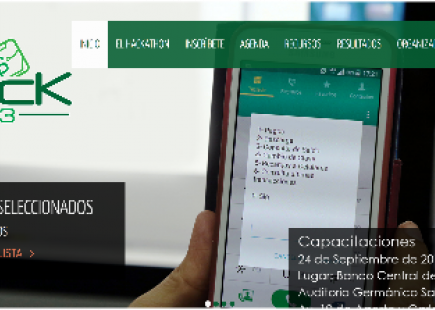

Source: Hack 153, 2016
In early 2018, the Central Bank Digital Cash was discontinued by Lenin Moreno after political pressure from the banks. Fortunately, the infrastructure is intact and the regulation straightforward to restore. Democratic suspicion of banks will make way for the return of sovereign digital cash.
References
Arauz, A. (2018) Fuga de capitales institucionalizada: las subsidiarias offshore de los bancos ecuatorianos. Tax Justice Network Annual Conference 2018.
[Atlanta Fed] Federal Reserve Bank of Atlanta (2011) Method and System for Screening Financial Transactions. United States Patent No. US 7,881,996 B1. 1 February 2011.
Avila, R. (2018) ‘Digital sovereignty or digital colonialism’, Sur International Journal on Human Rights.
[BIS] Bank of International Settlements (2017) Central bank cryptocurrencies. 17 September 2017.
[BIS] Bank of International Settlements (2018) Payment, clearing and settlement systems. BIS Statistics Explorer. 2 October 2018.
The Boston Consulting Group and Google (2016) Digital Payments 2020: The Making of a $500 Billion Ecosystem in India.
BHIM UPI (2018) Who we are.
Borio, C. (2018) On money, debt, trust and central banking. Keynote speech. Cato Institute, 36th Annual Monetary Conference. 15 November 2018, Washington, DC.
Brown, R. (1968 / 2013) A History of Accounting and Accountants. New York: Routledge.
[DeitY] Department of Electronics and Information Technology (2014) Digital India. Vision Areas of Digital India. Archive.
[Fed] Federal Reserve (2018) Central bank liquidity swaps. Last update: 17 October 2018.
Ferrari, E. (2018) They’re Ba-ack….JCPOA Withdrawal Nearing Completion with E.O. 13846. Sanction Law.
Forbes (2015) PayPal To Acquire Digital Money Transfer Company Xoom Before eBay Split. 1 July 2015.
Forbes (2017) How China's Central Bank Is Clamping Down On The Mobile Payment Industry. 18 August 2017.
Gilliard, L. (2004) La Banque d’Amsterdam et le Florin Européen au temps de la République néerlandaise (1610-1820). Paris: EHESS.
Graziani, A. (2003) The Monetary Theory of Production. Cambridge: Cambridge University Press.
Hack153 (2016) El Hackaton – Datos importantes.
Haering, N. (2017a) ‘A well-kept open secret: Washington is behind India’s brutal experiment of abolishing most cash’. Real-World Economics Blog. 3 January 2017.
Haering, N. (2017b) ‘How India became Bill Gates’ guinea pig: A conspiracy as recounted by the main actors’. Norbert Häring Money and More. 21 February 2017.
Haering, N. (2018) ‘Cashless economy brought about by demonetisation hurt the poor and the economy’. National Herald of India. 5 November.
Hall, C. (2017) ‘Visa Plans Its First Non-US Data Centers – In London and Singapore’. Data Center Knowledge. 28 July.
Hogg, C. (2018) Letter from Visa regarding service disruption. 15 June.
Horowitz, J. (2018) ‘Why American credit card companies can’t break into China’. CNN Money. 3 August.
Houben A. et al. (2018) Central Bank Digital Currencies. Bank of International Settlements. Committee on Payments and Market Infrastructures. Markets Committee. March.
[IMF] International Monetary Fund (2018) Republic of the Marshall Islands: 2018 Article IV Consultation-Press Release; Staff Report; and Statement by the Executive Director for the Republic of the Marshall Islands. 10 September.
[IRS] Internal Revenue Service (2018) FACTA IDES Resources and Support Information. 26 February.
Jonker, J. (2005) ‘Lucien GILLARD, La Banque d’Amsterdam et le Florin européen’, Histoire & mesure [Online], XX(3/4).
Kalra, A (2018) Exclusive: U.S. senators urge India to soften data localization stance. Reuters. 13 October.
Kaminska, I. (2016) Cbank digital currencies and the path to Gosbankification. 29 July.
Kumar, A. (2017) ‘Demonetisation's short-term costs were high, long-term benefit doubtful’. Mirror Now News. 7 November.
Kumar, K. and Muhota, K. (2012) Can Digital Footprints Lead to Greater Financial Inclusion? Washington, DC: CGAP (Consultative Group to Assist the Poor).
Lagarde, C. (2018) Winds of Change: The Case for New Digital Currency. 14 November.
Macnee, W. (2017) Hearing Entitled ‘International Development: Value Added Through Private Sector Engagement’ Testimony of Walt M. Macnee, Vice Chairman, Mastercard Before the U.S. Senate Committee on Foreign Relations. 4 May.
Mancini, T. et al. (2018) Casting Light on Central Bank Digital Currencies. IMF Staff Discussion Notes No. 18/08. 12 November.
Manish, S. (2017) India’s war on cash: ATM network expansion has seen sharp drop since 2014. Business Standard. 28 June.
McRee, D. (2015) The War on Cash: How Governments, Banks, Nonprofits and Academics are Abolishing Cash. David McRee.
[MeitY] Ministry of Electronics and IT, Government of India (2018) About Paygov: Aggregation of all Payment Channels.
[Nilson] The Nilson Report (2017) Global Cards – 2015.
[OFAC] Office of Foreign Assets Control (2014) Treasury Reaches Largest Ever Sanctions-Related Settlement with BNP Paribas SA for $963 Million. Press Center.
[OFAC] Office of Foreign Assets Control (2018) Settlement Agreement between the US Department of the Treasury’s Office of Foreign Assets Control and Société Generale S.A Press Center. 19 November.
[OPC] Office of the Privacy Commissioner of Canada (2005) Bank’s notification to customers triggers PATRIOT Act concerns. PIPEDA Case Summary #2005-313.
Reeg, R. (cited in Wailhum, T.) (2008) The Man Behind MasterCard’s 100 Terabyte Data Warehouse. CIO. 17 July 2008.
Reuters (2018) U.S. blocks MoneyGram sale to China’s Ant Financial on national security concerns. 2 January.
Russel, C. (2015) Who’ll Win? Visa and MasterCard versus UnionPay. CKGSB Knowledge.
Scott, B. (2018) Twitter @Suitpossum. 20 November 2018. Archive.
Sing, S., and Narayanan, D. (2018) India’s data localisation push can give rise to new business opportunity. The Economic Times. 25 October 2018.
Soll, J. (2014) The Reckoning: Financial Accountability and the Rise and Fall of Nations. New York: Basic Books.
Smith, W.D. (1984) ‘The function of commercial centers in the modernization of European Capitalism: Amsterdam as an information exchange in the seventeenth century’, Journal of Economic History 44 (4): 986.
SUCRE (2010) Informe de Gestón 2010. Consejo Monetario Regional del Sistema Unitario de Compensación Regional de Pagos.
SWIFT (2018) Julien Blanchez appointed Head of Data Analytics at SWIFT. 28 September.
[UN] United Nations (2009) Report of the Commission of Experts of the President of the United Nations General Assembly on Reforms of the International Monetary and Financial System.
[WTO] World Trade Organization (2012) China – Certain Measures Affecting Electronic Payment Services. Report of the Panel. WT/DS413/R, WT/DS413/RA1. 16 July.
[WTO] World Trade Organization (2013a) WT/DSB/M/334. Dispute Settlement Body – Minutes of meeting – 23 July 2013.
[WTO] World Trade Organization (2013b) China – Certain Measures Affecting Electronic Payment Services - Understanding Between China and the United States Regarding Procedures under Articles 21 and 22 of the DSU. WT/DSB/M/334. 21 August.
[WSJ] Wall Street Journal (2018) China Approves American Express Card Service, Addressing U.S. Concerns About Markets. 9 November.
Yamey, B.S. (1949) ‘Scientific Bookkeeping and the Rise of Capitalism’, The Economic History Review. Second Series, 1 (2 & 3).
Zarate, J.C. (2013). Treasury’s War: The Unleashing of a New Era of Financial Warfare. New York: Public Affairs.